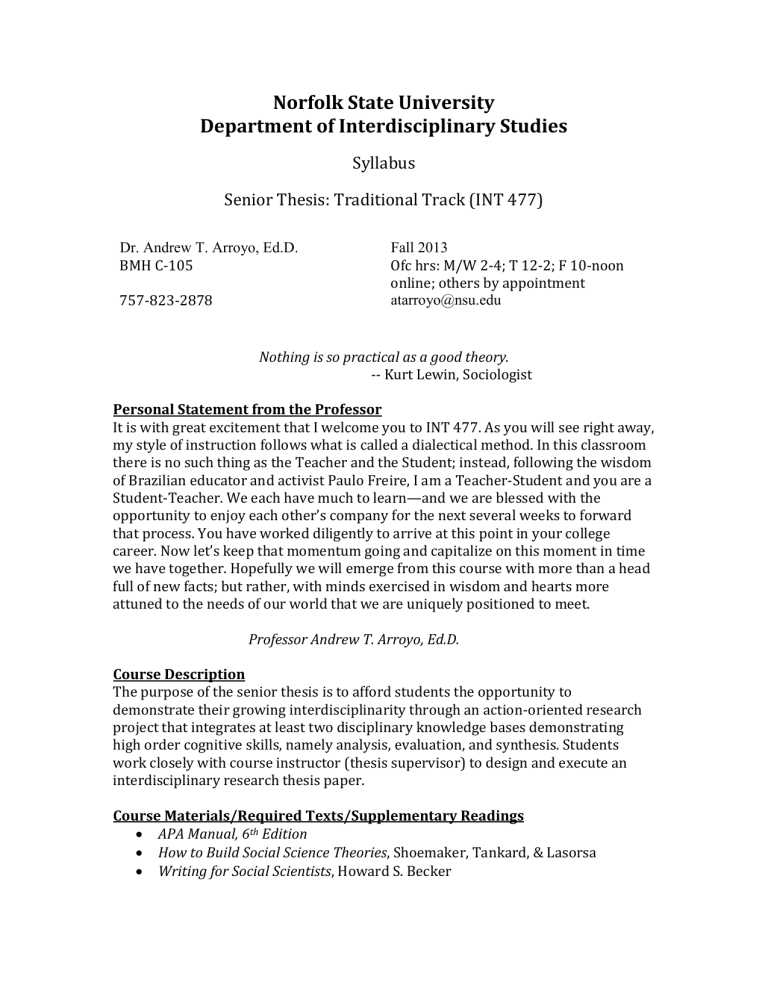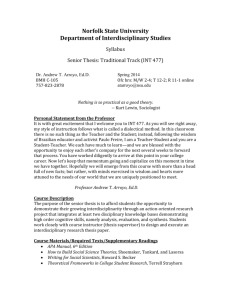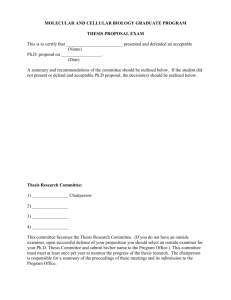File

Norfolk State University
Department of Interdisciplinary Studies
Syllabus
Senior Thesis: Traditional Track (INT 477)
Dr. Andrew T. Arroyo, Ed.D.
BMH C-105
Fall 2013
Ofc hrs: M/W 2-4; T 12-2; F 10-noon online; others by appointment atarroyo@nsu.edu 757-823-2878
Nothing is so practical as a good theory.
-- Kurt Lewin, Sociologist
Personal Statement from the Professor
It is with great excitement that I welcome you to INT 477. As you will see right away, my style of instruction follows what is called a dialectical method. In this classroom there is no such thing as the Teacher and the Student; instead, following the wisdom of Brazilian educator and activist Paulo Freire, I am a Teacher-Student and you are a
Student-Teacher. We each have much to learn—and we are blessed with the opportunity to enjoy each other’s company for the next several weeks to forward that process. You have worked diligently to arrive at this point in your college career. Now let’s keep that momentum going and capitalize on this moment in time we have together. Hopefully we will emerge from this course with more than a head full of new facts; but rather, with minds exercised in wisdom and hearts more attuned to the needs of our world that we are uniquely positioned to meet.
Professor Andrew T. Arroyo, Ed.D.
Course Description
The purpose of the senior thesis is to afford students the opportunity to demonstrate their growing interdisciplinarity through an action-oriented research project that integrates at least two disciplinary knowledge bases demonstrating high order cognitive skills, namely analysis, evaluation, and synthesis. Students work closely with course instructor (thesis supervisor) to design and execute an interdisciplinary research thesis paper.
Course Materials/Required Texts/Supplementary Readings
APA Manual, 6 th Edition
How to Build Social Science Theories, Shoemaker, Tankard, & Lasorsa
Writing for Social Scientists, Howard S. Becker
Related University-Wide and Course Specific Requirements
The following competencies are required and assessed in INT 477: (a) writing; (b) information technology literacy; and (c) critical thinking. By the end of this course, students should be able to write clearly, concisely and analytically. Students’ writings should include demonstration of reading completion and comprehension, application when necessary, critical thinking, independent thinking, analysis, synthesis and argumentation. Students’ critical thinking abilities will be assessed on their presentation of ideas (others and their own), problem-solving capabilities, synthesis, evaluation, analysis and clarity of thought (including language use and comprehension).
Course Policies/Requirements
Attendance (Participation)/Tardiness Policy—See below.
Cell Phone Policy—Cell phones should be silenced and put away during class. No texting is permitted at any time.
Discussion Board Requirements (online courses only) – Regular participation in the discussion boards is expected. See below.
Late Work Policy -- Late work is not accepted unless prior authorization has been given or a doctor’s note is provided after the fact. In the event late work is accepted, it is subject to point deductions at the discretion of the professor, up to 10% per day.
Email – Only official NSU email accounts should be used for course correspondence. Students should check their email a minimum of three times per week to avoid missing vital course announcements.
Weather Policy—In case of inclement weather, students should listen to local major radio and television stations; visit the NSU website at www.nsu.edu
; and/or call the University operator at 757-823-8600. Students are responsible to be present for class unless an official closure has been announced. Online courses are not subject to university closures.
Incomplete Policy—You must be passing the course and have completed at least 50% of the work in order to qualify for an incomplete at the professor’s discretion. Incompletes are rarely granted.
Disability Policy—In accordance with section 504 of the 1973
Rehabilitation Act and the American with Disabilities (ADA) of 1990, any student with a disability or who thinks s/he may have a disability, please make contact with the Supporting Students through Disability Services
(SSDS) Office.
Academic Integrity/Plagiarism Policy—Plagiarism is defined as using other people’s work as your own without crediting them, including but not limited to: copying others’ notes, exams, essays, or information, quoting and paraphrasing others’ ideas without giving them credit and proper documentation; using information from the internet without properly citing source, website address (URL), author, date, etc. Plagiarism is a form of cheating and will result in an assignment grade of F and possibly an overall
course grade of F. Any instance of academic dishonesty will NOT be tolerated.
See the student handbook for a description of the honor policy and the consequences for violations.
Use of the World Wide Web for research—For this and all courses I teach, the following sources are acceptable: books, magazines, newspapers, and scholarly journals. No websites are accepted for research purposes in any paper/project. This includes Wikipedia.
Success Policy—The best policy for success in any course is preparation, time management, and constant communication with the professor. Be proactive instead of reactive. Attending college is a privilege, not a right. You are accountable for everything that is in this syllabus, and everything covered in class. The buck stops with YOU!
Grading Scale:
100-95 = A (Superior)
94-90 = A-
89-87 = B+ (Very Good)
86-84 = B
83-80 = B-
79-77 = C+ (Average to Adequate)
76-74 = C (INT majors must earn C or better to gain credit towards graduation.)
72-70 = C-
69-67 = D+
Thesis
66-64 = D
63-60 = D-
59 & below = F
Assignments
Class attendance
Proposal
Mandatory – Missing more than 1 = Course Failure
Mandatory – Failure to submit = Course Failure
100%
*The reason class attendance and the proposal do not have percentages attached is because they are essential building blocks for the thesis, but ultimately it will be your thesis that will determine your ability to move on to graduation or not. ALL parts of this course, from attendance to the proposal to the thesis are intertwined. There is no way to separate them.
Course Assignments and Schedule
Email the proposal and final thesis in MS Word as attachments to atarroyo@nsu.edu by the dates listed below.
Proposal due date = Sept 20, 11:59pm
Final thesis due date = Nov 22, 11:59pm
Discussion boards due dates = see Blackboard. New discussion boards will be opened at various intervals throughout the course to supplement our face to face interactions. Participation is not mandatory or graded, but I look at things like this when gauging your overall dedication to the course. This can easily make the difference between a plus or minus grade, or even a letter grade in the end. It’s no guarantee, but it’s good insurance to show you are serious and engaged.
This is an intensive course requiring your constant engagement and discipline. Stay with it!








